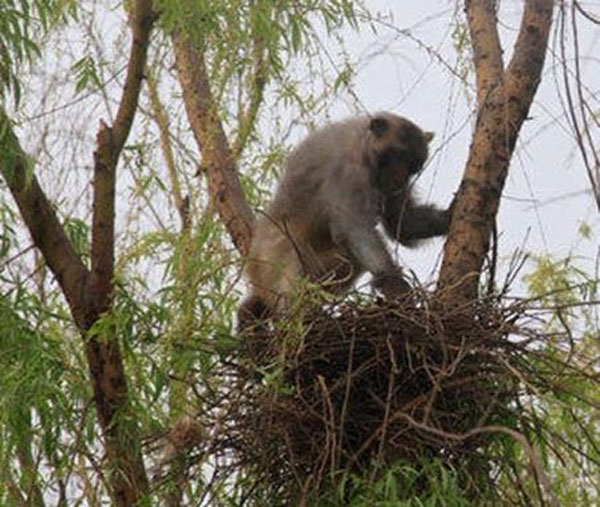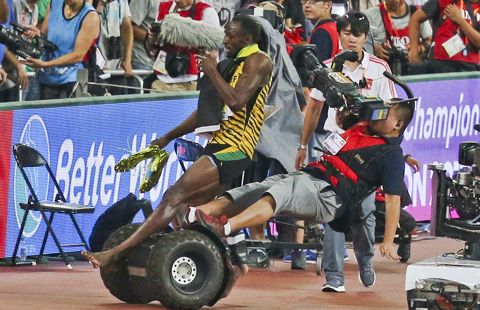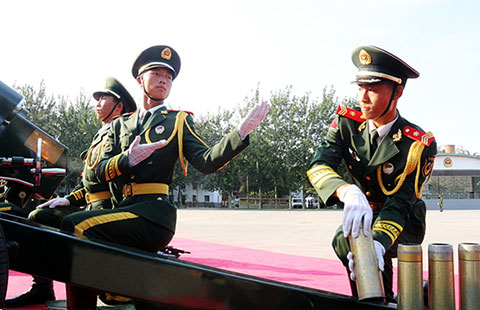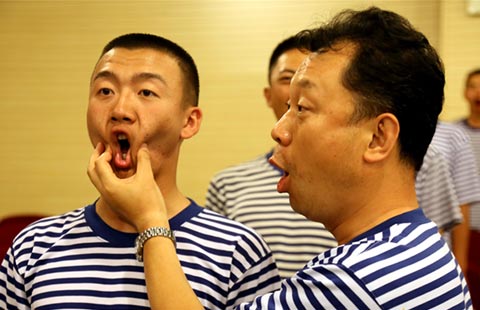All creatures great and small help keep V-Day parade safe
Updated: 2015-08-28 08:58
By Yao Yao(chinadaily.com.cn)
|
||||||||
 |
|
A macaque tears down a bird's nest. [Photo/jz.81.cn] |
Macaques, saker falcons and harriers are being trained to disperse birds at an air force station in Beijing to ensure 10 air echelons for the Sept 3 parade fly without the risk of bird strikes,the Beijing News reported on Wednesday.
Bird strikes are thought to be the most common reason for flight disasters, according to the World Air Sports Federation, and 10,000 flights are estimated to suffer the strikes around the world annually.
The impact caused by a bird weighting 1.8 kilograms colliding with a plane flying at 700 km per hour is greater than that of a military shell.
To ensure the echelons'training, soldiers have had to find ways to disperse the birds, whose activities become more frequent when fledglings begin to leave their nests.
"I have raised and trained three macaques since last April to help disperse birds," said Ma Junliang, a member of the station's bird control team.
After a three-month training course, a macaque can climb a high tree and use its hands to throw down twigs making up a nest, then flatten it. The whole process lasts less than two seconds and the macaque is then lead by Ma to tear down another.
"Five macaques in my team can tear down 12 bird's nests a day," said Ma.
The macaques leave scents after tearing down the nests and the birds, sensitive to that smell, will not rebuild in the same places.
Han Bing, political commissar of an air force station, said: "Using macaques to disperse birds has low costs and risks with high efficiency, and this is a first in the world."
As well as the macaques, Ma's team also train saker falcons and harriers to disperse birds.
The team will fly falcons two hours before the planes takeoff. Since many birds stay in grassland at the station, the harriers are sent to drive the birds in the grassland to fly up into the sky, then the hovering falcons frustrate and disperse the birds.
Ma's team said the trained animals disperse the birds instead of killing them and the birds can choose other places to build their nests, minimizing the effects on ecology.

 Bolt 'somersaults' after cameraman takes him down
Bolt 'somersaults' after cameraman takes him down
 A peek into daily drill of ceremonial artillery unit
A peek into daily drill of ceremonial artillery unit
 93-year-old's murals save Taiwan's 'Rainbow Village'
93-year-old's murals save Taiwan's 'Rainbow Village'
 Top 8 novel career choices in China
Top 8 novel career choices in China
 Hairdos steal the limelight at the Beijing World Championships
Hairdos steal the limelight at the Beijing World Championships
 Chorus of the PLA gears up for Sept 3 parade
Chorus of the PLA gears up for Sept 3 parade
 Iconic Jewish cafe 'White Horse Coffee' reopens for business
Iconic Jewish cafe 'White Horse Coffee' reopens for business
 Beijing int'l book fair opens new page
Beijing int'l book fair opens new page
Most Viewed
Editor's Picks

|

|

|

|

|

|
Today's Top News
China eases rules for foreigners to buy property
Ministry denies troops sent to reinforce DPRK border
Stem cell donor offers ray of hope for US boy with leukemia
All creatures great and small help keep V-Day parade safe
China not the only reason global stock markets are in a tailspin
Market woes expected to delay Fed hike
Gunman had history of workplace issues
11 under probe and 12 detained over Tianjin blasts
US Weekly

|

|






